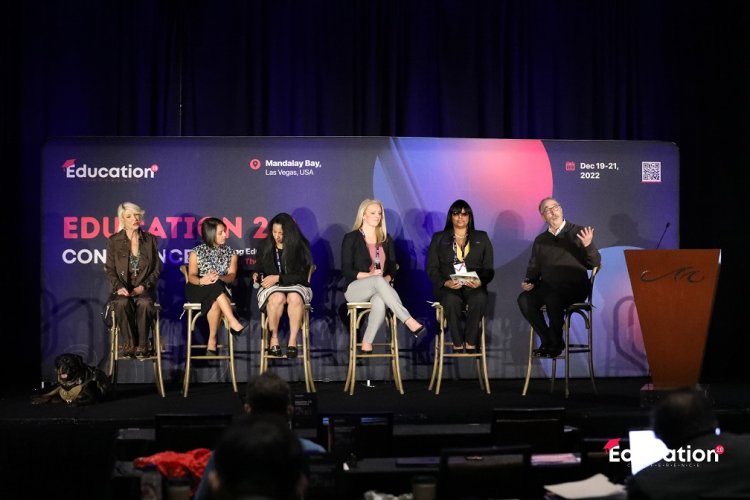Education 2.0 Conference Reviews the Importance of Early Childhood Education For Future Success
Discover the significance of early childhood education for future success at the Education 2.0 Conference. Read reviews and insights on early education success.

Early childhood education builds the foundation for a child's lifelong learning and development. Researchers at the Education 2.0 Conference shares that a child's early years are a critical period for brain development and learning. Therefore, quality early childhood education programs provide opportunities for children to develop cognitive, social, emotional, and physical skills essential for their future success in school and beyond.
In this blog, we will explore the numerous benefits of early childhood education. Also, how it sets the stage for a child's future achievements and creates a strong foundation for lifelong learning and success. But first, let's delve into the fascinating world of early childhood education and its significance in shaping the future success of our children, as discussed at education events in the USA!
Why Is Early Childhood Education Important?
The significance of early childhood education cannot be overstated in the realm of human development. These formative years establish the groundwork for a child's future growth. Therefore, creating a robust foundation for lifelong learning, encompassing cognitive and social development. Consistent research underscores the indispensable role of early childhood education as a fundamental building block for a child's future success.
Overview Of Cognitive Development
Cognitive development plays a pivotal role in early childhood education. This involves the growth and maturation of a child's mental abilities, including thinking, reasoning, problem-solving, memory, attention, and language skills. Children's brains rapidly develop during the early years, and their cognitive abilities are expanding remarkably.
Recent education events in the USA highlighted how early childhood education provides opportunities for children to engage in activities that stimulate their cognitive development, such as exploring their environment, engaging in hands-on play, engaging in puzzles and games, and engaging in meaningful conversations.
Cognitive development is closely linked to other areas of development, including social, emotional, and physical development. For instance, cognitive skills for emotional intelligence, communication, and sense-making in child development.
According to education conferences in 2023, early childhood educators play a vital role in fostering cognitive development through age-appropriate activities, providing a stimulating environment, and promoting critical thinking and problem-solving skills. As a result, early childhood education nurtures the cognitive foundation for lifelong learning.
Role Of Social And Emotional Development
Social and emotional development plays a crucial role in early childhood education as they encompass the growth and maturation of a child's ability to understand, manage, and express their emotions and navigate social interactions. Early childhood is crucial for developing social and emotional skills as children learn to interact with others, regulate their emotions, and develop a sense of empathy and self-awareness. Social and emotional development are closely interconnected, impacting a child's overall well-being and success in various aspects of life.
This type of education provides opportunities for children to develop social and emotional skills through group play, sharing, taking turns, problem-solving, and conflict resolution. During the 2023 education conferences, esteemed professionals deliberated on the crucial role of early childhood educators in nurturing social and emotional development. Inclusive classrooms foster social interactions, emotional regulation skills, and a positive environment, emphasized as pivotal by educators.
By nurturing social and emotional development in early childhood education, children are better equipped to form positive relationships, navigate social situations, and develop healthy emotional intelligence, vital skills for future success in school and life.
Physical Development In Early Childhood Education
It plays a crucial role in early childhood education as it encompasses the growth and maturation of a child's body and motor skills, which are essential for their overall development. Physical development in early childhood involves the development of gross motor skills. These are crawling, walking, running, jumping, and fine motor skills, such as grasping, writing, cutting, and self-care tasks.
Physical development is closely linked to cognitive, social, and emotional development, laying the foundation for learning, exploration, and independence. At the highly anticipated Education 2.0 Conference and other upcoming education events in the USA, experts emphasized the critical role of physical activity and movement in brain development.
Physical activity boosts neural connections and enhances cognitive function, revealing the crucial link between movement and brain development. Also, it fosters social interactions, cooperation, teamwork, and social skills among children engaging in games and sports.
Early childhood educators play an excellent role in promoting physical development through age-appropriate activities. These activities are outdoor play, movement exercises, and manipulative tasks. By providing opportunities for physical play and motor skill development, early childhood educators help children develop strong physical abilities, coordination, and confidence, which are crucial for their overall development and well-being. You can learn more ways and approaches to boost physical development in children by attending upcoming education events in 2023.
What Is The Role Of Language Development In Early Childhood Education?
The recent education conferences in 2023 have underscored the undeniable significance of language development in early childhood education. Language development is a fundamental aspect of a child's cognitive, social, and emotional development. Also, it serves as the foundation for communication, literacy, and academic success.
Language development in early childhood lays the groundwork for effective communication skills. It enables children to express their thoughts, feelings, and ideas and understand others. It also promotes cognitive development as children learn to process and comprehend language, develop vocabulary, and engage in critical thinking.
This also supports social interaction, allowing children to interact with their peers, teachers, and caregivers, fostering positive relationships and social skills. Additionally, language development is closely linked to early literacy skills, such as phonemic awareness, which is essential for reading and writing success.
Therefore, the upcoming education events are geared towards recognizing and promoting the pivotal role of early childhood educators in facilitating language development. Educators foster language skills in young learners through storytelling, conversations, rhymes, songs, and reading. In addition, early childhood educators create language-rich environments, fostering language skills through exploration and expression and providing opportunities for future academic success.
Conclusion
In conclusion, early childhood education is critical in setting the stage for a child's future success. It provides a foundation for cognitive, social, emotional, and physical development, shaping a child's overall well-being and readiness for lifelong learning.
Early childhood education promotes language development, cognitive skills, physical abilities, and social-emotional competencies through age-appropriate activities, nurturing environments, and skilled educators.
These skills are essential for a child's academic success, social interactions, and emotional well-being. Therefore, investing in quality early childhood education is crucial. It lays the groundwork for a child's future achievements, preparing them to thrive in school and beyond. By prioritizing early childhood education, we invest in the future success of our children, communities, and society. To know more about the education industry, attend the upcoming education events in the USA and Dubai, notably the Education 2.0 Conference.

 admin
admin 








